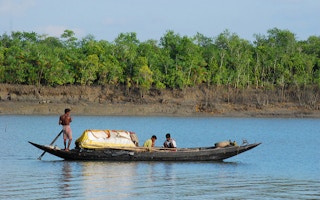Bangladesh is planning its biggest power plant yet — a 1320 megawatt coal-fired power plant, slated to be built very close to the Sundarbans, the world’s largest mangrove forest and a World Heritage Site.
But conservation groups, environmentalists and activists have strongly condemned the project. They argue that building a coal power plant just 14 kilometers (~8.7 miles) away from the Sundarbans could damage its fragile ecosystem, threatening not just its wildlife but also the livelihoods of the thousands of people who depend on the massive mangrove forest.
Now, a UNESCO report has confirmed these concerns. A mission to the power plant site found that the project will severely damage the Sundarbans and should be “cancelled and relocated to a more suitable location.”
“I believe that the Sundarbans does not just belong to Bangladesh, it belongs to the world. So UNESCO is correct and has rightly pointed out the issues about the proposed Rampal power plant and the Sundarbans,” Abdullah Harun Chowdhury, a professor of environmental science at Bangladesh’s Khulna University, told Mongabay.
“If the Rampal power company doesn’t follow the UNESCO report’s recommendations, then Sundarbans will get gradually destroyed.”
The power plant, located at Rampal Upazila in Bangladesh, is being implemented by the Bangladesh India Friendship Power Company (BIFPC), a joint venture between the Bangladesh Power Development Board and India’s National Thermal Power Corporation. Construction has started and the plant is proposed to become operational by 2020-21, BIFPC’s Public Relations Manager, Anwarul Azim, told Mongabay earlier this year.
“
If the Rampal power company doesn’t follow the UNESCO report’s recommendations, then Sundarbans will get gradually destroyed.
Abdullah Harun Chowdhury, professor of environmental science, Khulna University
In March 2016, the UNESCO World Heritage Committee sent a mission to Bangladesh to follow up on the concerns that have been raised against the power plant. After visiting the site of the Rampal power plant, locations of some of the most recent ship accidents in the region, and meeting with several experts, the mission identified four major concerns related to the plant’s construction.
First, the air pollution resulting from burning coal, and the coal ash that will be generated by the plant every year, could severely contaminate the surrounding Sundarbans air, the report found. Second, the power plant is expected to discharge more than 5,000 cubic meters per hour of cooling wastewater into the Pashur River, which can seriously undermine the region’s water quality. Moreover, the ash waste that the plant generates could come in contact with the water, contaminating the waterways.
Third, the plant is expected to extract water from the Pashur river for construction of the power plant and all its associated settlements, which can further degrade the waterways. Fourth, rivers will have to be dredged to ensure movement of ships that carry coal to the plant, the report notes, especially since most of the coal will be imported. Shipping traffic is expected to increase, the authors write, which is worrying, given some of the recent shipping accidents involving coal and oil spills in the region.
These threats have not been adequately addressed in the plant’s Environmental Impact Assessment (EIA), the report warned. The authors also point out that “the plant itself is not applying the best available technology or the highest international standards for preventing damage commensurate with its location in the near vicinity of a globally unique World Heritage property.”
The Sundarbans is home to hundreds of animal and plant species, including the endangered Bengal tiger (Panthera tigris), as well as the only two remaining species of freshwater dolphins in Asia — the threatened Irrawaddy river dolphin (Orcaella brevirostris), and the endangered Ganges river dolphin (Platanista gangetica).
The report concludes that the Rampal power plant project poses a serious threat to this World Heritage Site and should be canceled or relocation to an alternate, safer site.
“The National Committee for Saving the Sundarbans (NCSS) is heartened that the monitoring mission has firmly agreed with scientists and concerned citizens raising the alarm that the Rampal plant absolutely would damage the Sundarbans,” advocate Sultana Kamal, convener of the NCSS, said in a statement.
“Our government must take immediate action to publicly cancel the Rampal plant and associated river dredging, and pursue exclusively clean energy for all Bangladeshis that safeguards our water, air, fisheries, forests, wildlife, and our health.”
This story was published with permission from Mongabay.com








